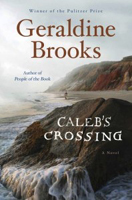 |
A new novel from Geraldine Brooks is always major event in Australian publishing - you'll recall she won the Pultizer Prize for March back in 2006. So as she has her latest book, Caleb's Crossing, out in the bookshops, the writer is interviewed by Mark Rubbo for Readings. |
In an interview you said that your journalistic training meant that you threw words down on the page and then fixed them up later. The voice in this book, the young woman Bethia who befriends the young Indian, is perfect in expression and tone and is as one would imagine a young woman in the seventeenth century would write. This seems to belie the 'throwing down of words'. Can you tell us - how you do find the voice?
Some days the writing is fluid, some days not. Those days, you go back to the ma- terial the next day, and revise and revise until it feels right. The voice for Bethia was more difficult than many because there is little written by colonial women or girls before 1750 that has survived, and my tale takes place 100 years earlier. I had a few shards of verbatim court records, a few letters and so forth from the period, but not a lot. I had to create her voice from these scant raw materials.
The impact of Europeans on the indigenous society and culture seems peripheral to the American story. Do you agree, and is this something Caleb's Crossing is trying to redress?
I would disagree with that. I think it is integral to the story, which doesn't mean there aren't the same controversies, the same labelling as 'black armband history' that we encounter in Australia when someone tries to probe first contact and the history of indigenous relations with European colonists.
